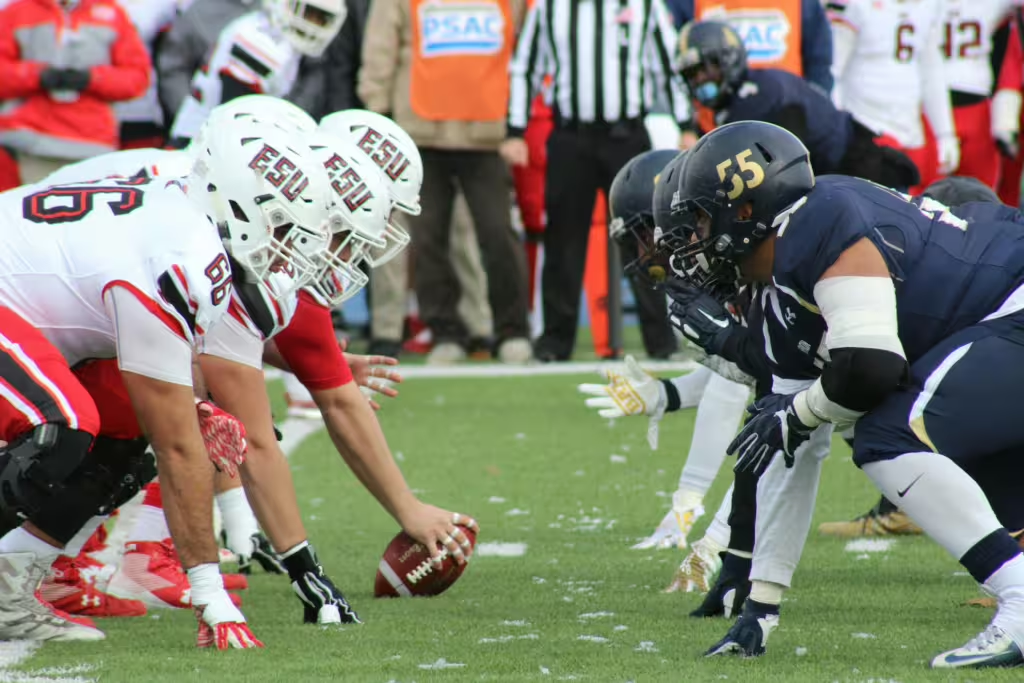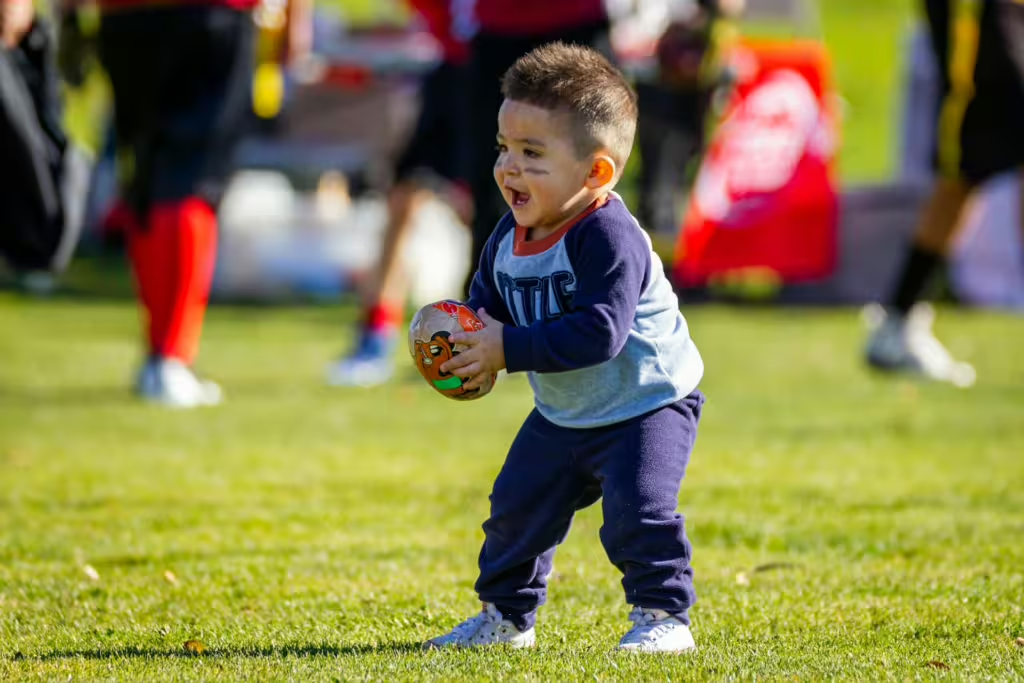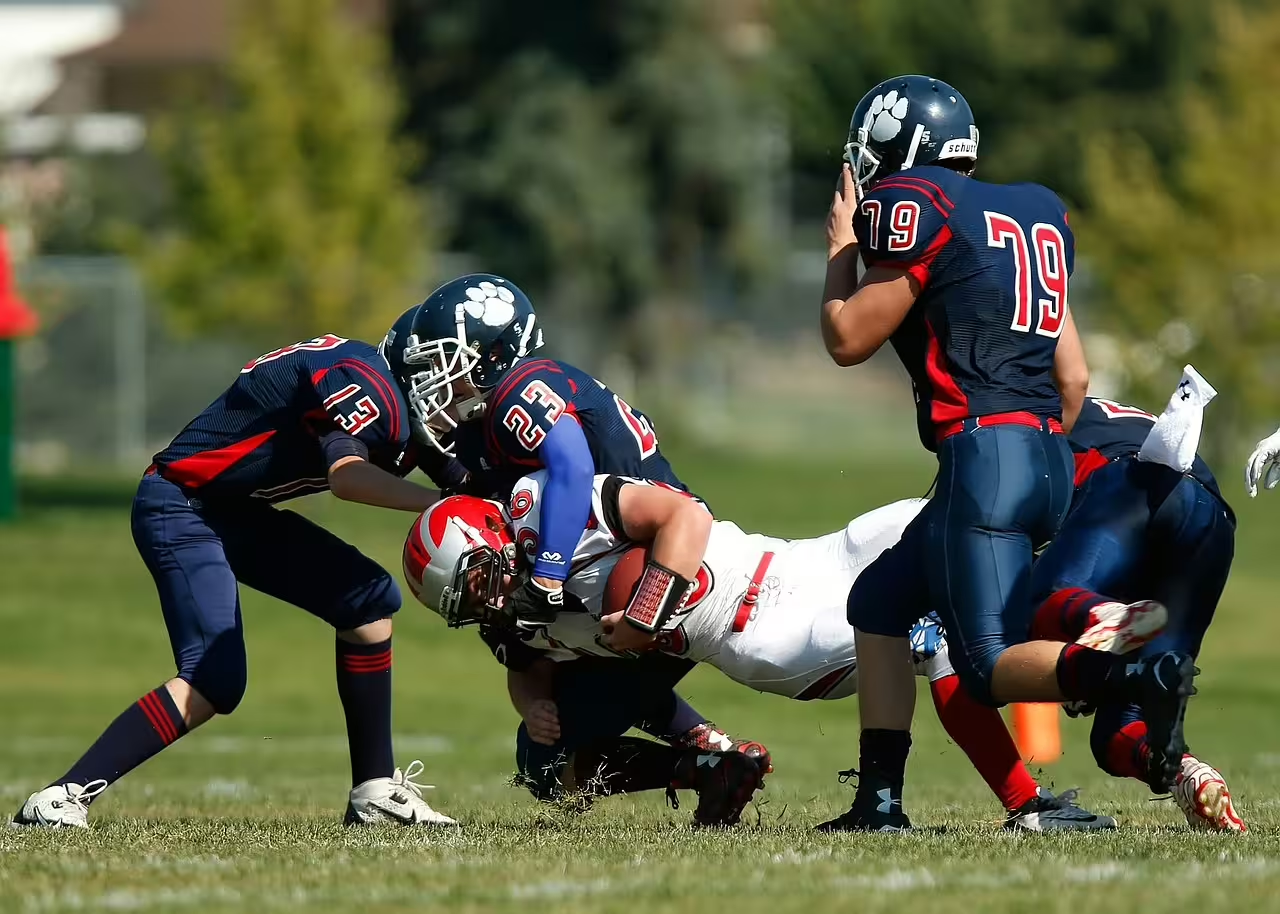Football isn’t easy. Not only does it take a serious amount of strength, stamina, and body control, it requires young athletes to develop a host of other mental skills as well. Players need to learn how to communicate with teammates, memorize plays, and be mentally flexible. Perhaps these facets of the sport are the reason that many young players seem determined to give up before they even get going.
Putting all the difficulty aside, youth football can be an incredible experience for children. Developing the skills and physical attributes mentioned previous doesn’t have to be grueling, and most times it is actually quite enjoyable; the trick lies in making sure the child retains confidence in their ability to play all the way through.
Part of this has to do with the fact that football happens to be a high-contact sport where the fear of injury and the pressure to perform can hold young players back. This is where parents come into play. It’s our job to help our kids navigate these challenges and build the self-confidence they need to be able to enjoy and excel at the game of football.
In this article, we will provide parents with a few actionable strategies they can use to support their children emotionally and mentally. These tips and tricks will not only help kids to excel at the sport and keep an even keel, but also feel good about playing it.
Why Confidence Matters in Youth Football

Confidence is the cornerstone of success in just about any sport you can imagine. These activities require varying degrees of skill, understanding, and physical fortitude, and mistakes or missteps can happen at any point. That is why it is crucial that kids come equipped with some measure of resilience and self-confidence when they get ready to play.
Football, given how aggressive, fast-paced, and physically-demanding it can be, is especially reliant on confidence. Confident players are more likely to take risks, bounce back from inevitable setbacks, and engage fully in the game. And there will be setbacks, make no mistake! Think about every football game you’ve ever seen, sometimes that long path to the end zone is littered with safeties, stops, and tackles.
Here are a few reasons why building confidence is so essential:
Fear of Injury: Football’s physical nature can be intimidating, especially for younger or inexperienced athletes. Confidence helps children beat their pre-game jitters to overcome the innate fear that comes with not wanting to be tackled. It also helps kids play more assertively, a valuable skill for certain roles on the football field.
Pressure to Perform: As with most team sports, there can be high expectations from coaches, teammates, parents, and peers associated with the game of football. Such expectations an weigh heavily on a child. But having self-confidence reduces the risk of them developing performance anxiety, allowing them to focus on improving their skills and having fun.
Team Dynamics: This concept isn’t always obvious, but players who are more confident contribute greatly to team morale. These players have a positive, uplifting effect on every players, fostering a supportive and cohesive environment for everyone involved.
Encouragement Tips for Building Confidence
Focus on Effort Over Outcome
We here at Cultured Athlete have always been big advocates of praising effort rather than results, as doing so will help your child understand that improvement can only come from hard work and perseverance. That’s why, whether your kid scores a touchdown or misses a tackle, always highlight the hustle. Let them know that showing determination and willingness to try is more important to their long-term success than anything else.
Point out things in this way, saying. “I loved how hard you worked during practice today. That kind of effort is what helps you get better!” At the same time, try to avoid statements like “You’re the best on the team,” as saying such things can create unnecessary pressure.
Normalize Mistakes as Learning Opportunities
We all know that mistakes are an inevitable part of any sport, but it’s not always easy for a beginner or even an intermediate player to see this; especially if they are particularly competitive. How a child perceives mistakes them greatly can impact their confidence. That is why we need to teach them that errors are opportunities to learn and grow.
You can take them aside after a tough game and ask them, “What’s one thing you learned today that you can work on?” Also, don’t be afraid to share stories of famous athletes who overcame setbacks to achieve greatness.
Create a Positive Home Environment
This likely doesn’t have to be said, as if you’re concerned enough to read this article, you likely have a vested interest in supporting your child’s success at sports, but having a supportive home environment is crucial for building a child’s confidence. This is yet another reason why we encourage parents to celebrate their small victories and provide comfort when setbacks occur. Easy ways to do this are to display their football achievements, such as team photos or certificates, at home. and to avoid negative comparisons with other players. The latter of these is highly-important, as it can diminish a child’s self-worth more than many people realize.
Help Them Develop Skills Gradually

There’s a saying that is particularly poignant in this instance; confidence grows with competence. By helping your child improve their skills right from the start and moving up slowly, step by step, you can build up their confidence. Don’t go too fast, though. Start with the basics and gradually move up to more advanced techniques.
For example, if your child struggles with tackling, have them practice proper form in a controlled and non-intimidating environment; i.e. not with a pack of aggressive football players charging toward them. Parents might even consider private coaching sessions or additional practices to build competence in specific areas their child might be weak in.
Addressing Fear of Injury
Football’s physical nature, including its high-contact environment, can understandably be a source of anxiety for young players, especially if they have experienced or witnessed injuries. Fear of injury may prevent a child from playing to their potential or even discourage them from participating at all. Parents can play a crucial role in addressing these concerns by promoting safety, building physical preparedness, and boosting mental resilience. Here are strategies to help alleviate those fears:
Emphasize Safety Training
We always want our child to be safe when they play sports but it’s obvious that some sports are a trifle more dangerous than others; and kids know it. Thus, parents should always reassure their children that safety is a top priority in football. Explain that their coaches, teammates, and equipment are all pieces of this safety puzzle, ensuring they stay protected. If they still seem concerned, point out and discuss specific safety measures that are taken during practices and games to minimize risks.
Remind them that coaches are there to teach them and their peers the proper tackling techniques and basics they need to stay safe. Tell your children to pay close attention during training and to use proper form when practicing at home or with their teammates. Parents should also remind their children that engaging in dangerous play is strictly forbidden and can be punished at the coach’s discretion.
Encourage your kids to ask questions about the training or the safety gear. If they seem reticent to do so, open up a dialogue on your own. Show them how the helmet, cleats, shoulder pads, and mouthguard works to protect their most vulnerable parts. Having a tangible understanding of proper safety will make them far less anxious about stepping onto that field.
Build Physical Confidence
It is very important that any young athlete be physically prepared to play their sport. This is actually a critical part of overcoming fear. When an athlete feels physically strong and capable, they are less anxious about being hurt on the field. This is why it’s important that parents encourage our children to engage in conditioning exercises, specifically those designed to improve an athlete’s strength, agility, and endurance.
Age-appropriate strength exercises, like bodyweight squats, push-ups, and resistance bands, are all great ways to help kids build up the muscles needed to absorb impact. Parents and coaches can incorporate drills that improve balance and coordination, such as cone drills, ladder exercises, or yoga into their players’ routines. These exercises enhance control over one’s own body and help prevent injuries during play and practice.
Use Visualization Techniques
Even in a game as cut-and-dry as football, visualization is a powerful mental tool that can be used to help players overcome fear or anxiety. This technique allows them to mentally rehearse their successful actions on the field. Teach them how to sit and think about executing moves like safe tackles, catching passes, or evading defenders. This mental practice work by making these common scenarios feel more familiar and manageable.
By focusing on safety, physical readiness, and mental preparation, parents can help young football players overcome any fears they may be harboring, ensuring they play with confidence and joy.
Fostering a Growth Mindset
One of the best things a parent can do for their child to build confidence is to foster a growth mindset. This is a popular way of thinking that is based on the belief that abilities can be developed through dedication and hard work. This way of thinking is essential for confidence in football, because it teaches children to focus on improvement rather than innate talent.
Encourage Self-Reflection
Parents can help their children reflect on their performance during practice or a game so that they can independently identify areas for growth. To start the ball rolling, ask them questions like: “What did you do well today?” or “What’s one thing you’d like to improve for next time?”
Set Realistic Goals
Parents should work with their kids to set achievable goals. With a growth mindset, those goals should always be focused on personal growth rather than needless comparisons with teammates. For instance, maybe at the start of the week you tell your child “This week, let’s focus on improving your catching skills during practice.” Leave it at that and let that small goal grow. Once they improve, move on to the next skill.
The Role of Coaches in Confidence Building
Parents aren’t the only ones who can help young players build up their confidence; coaches play a significant role in shaping a that confidence as well. This is why many parents keep an open dialogue with their kids’ coaches, as partnering with them can create a unified support system for the child.
Communicate with the Coach
Remember to share any concerns you have about your child’s confidence with their coach. A good coach will work with you and the kid to address these issues and create a positive environment. They may even find creative ways to up that confidence that you or even the experts here at Cultured Athlete haven’t thought of!

Observe the Coach’s Style
Pay attention to how your child’s coach provides feedback. The best coaches focus on constructive criticism and encouragement, rather than on success. This will help build the players’ confidence.
Signs of a Confident Football Player
As your child’s confidence grows, you may notice them changing in some positive ways:
- They may show greater willingness to take risks during games.
- The child may evince an improved focus and be giving more effort during practices.
- Confident kids display positive body language, such as standing tall and smiling more often.
- Kids who enjoy themselves and are confident in their abilities show enthusiasm about discussing the game, their team, and their future goals.
Cultured Athlete Says…
Remember, building confidence in youth football players requires a combination of emotional support, skill development, and a focus on fun and growth. As parents, we are uniquely positioned to provide a degree of encouragement and guidance that our children may need to overcome their anxieties and embrace challenges. When in doubt, just remember to stay positive and keep the dialogue open. Allaying fears is what we’ve been doing since they thought there were monsters in their closet, it should be no problem at all to help them overcome the anxieties of the football field.
Discover more from CulturedAthlete
Subscribe to get the latest posts sent to your email.






